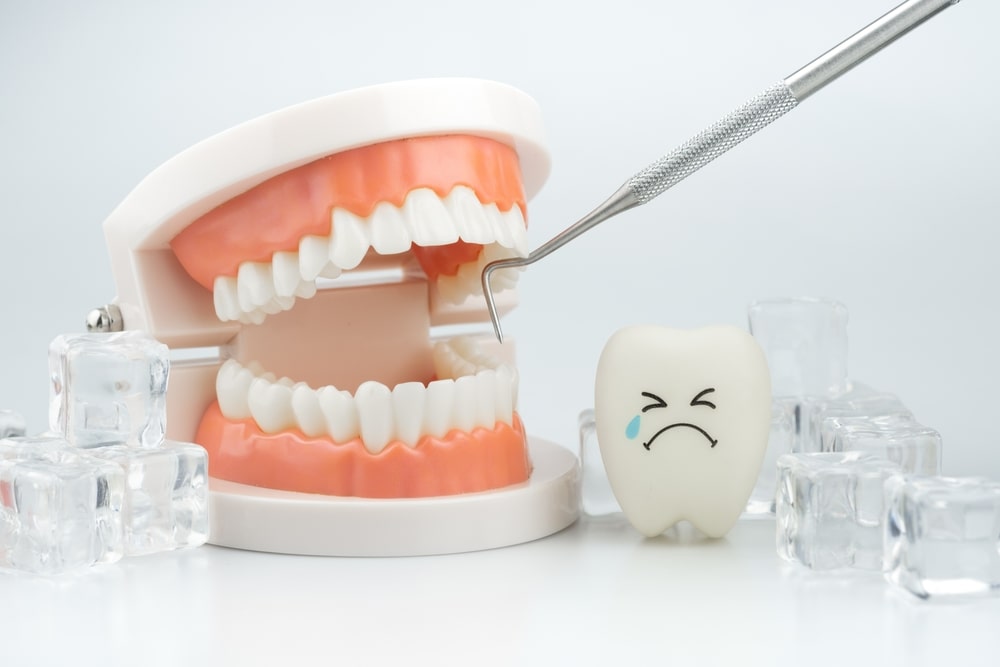Experiencing intense tooth pain or facial swelling? Don’t wait. These could be signs of a severe dental infection or abscess, a condition that requires urgent attention from a dental professional. Ignoring a dental abscess is not an option – it can lead to serious complications that affect your overall health. For residents of Markham dealing with this painful emergency, understanding the signs and knowing where to find prompt treatment is critical.
At Bur Oak Dental, we understand the urgency and discomfort of a dental emergency. Our team is here to provide timely and effective care for dental infections and abscesses across our three convenient Markham locations. Getting help quickly is the best way to relieve pain and protect your health.
What is a Dental Abscess?
A dental abscess is a localized collection of pus that forms in the gums or bone around a tooth.
It’s typically caused by a bacterial infection that has spread from the tooth’s pulp (the soft tissue inside the tooth) or from the gums.
This pocket of infection is the body’s response to try and contain the bacteria, but it’s also the source of significant pain and potential danger if left untreated.
Recognizing the Warning Signs of a Dental Abscess
While a severe toothache is often the most prominent symptom, a dental abscess can manifest in several ways.

Be aware of these critical warning signs:
- Severe, persistent, throbbing toothache: Pain that is intense and doesn’t subside, often radiating to your jaw, neck, or ear.
- Sensitivity: Increased sensitivity to hot and cold temperatures.
- Pain with Pressure: Discomfort or pain when chewing or biting down.
- Facial Swelling: Swelling in your face, cheek, or neck near the affected area.
- Fever: A general feeling of being unwell, potentially accompanied by a fever.
- Bad Taste or Odor: A sudden rush of foul-tasting or smelling fluid in your mouth if the abscess ruptures.
- Swollen, Red Gums: Gums that appear red, swollen, and tender.
- A Pimple-like Bump: A small, pimple-like bump on your gums (sometimes called a fistula or “gum boil”) that may drain pus.
It’s important to note that sometimes an abscess may not cause severe pain, especially if it has a channel for pus to drain.
However, the infection is still present and requires treatment.
Why Emergency Dental Treatment Can’t Wait
Delaying treatment for a dental abscess is risky. The infection is bacterial, and bacteria don’t stay put.
An untreated abscess can spread from the tooth or gum into surrounding tissues, including the jawbone, face, or even into the bloodstream, leading to life-threatening conditions like sepsis.
Dental infections are a common reason for emergency room visits, highlighting their potential severity.
Prompt dental treatment is essential not only for immediate pain relief but, more importantly, to stop the spread of infection and prevent systemic complications.
Emergency Treatment Options for Dental Abscesses
The primary goals of emergency treatment for a dental abscess are to eliminate the infection, relieve pain, and prevent complications.
A dentist will evaluate your specific situation to determine the best course of action. Treatment typically involves one or both of the following:
- Antibiotics: While antibiotics alone cannot cure an abscess (they don’t remove the source of infection), they are often prescribed to help control the bacterial infection, especially if it has spread or if there is significant swelling. Common antibiotics include amoxicillin or clindamycin, but only a dentist can determine if antibiotics are necessary and which type is appropriate for you.
- Drainage Procedures: This is the most crucial step to remove the pus and eliminate the infection source. Drainage can be achieved through several methods:
- Incision and Drainage (I&D): The dentist makes a small cut into the swollen area to allow the pus to drain out. This provides immediate pressure relief and helps clear the infection.
- Root Canal Treatment: If the abscess is caused by an infection originating from the tooth’s pulp, a root canal is performed. This procedure involves removing the infected pulp tissue from inside the tooth, cleaning the canals, and sealing them to prevent future infection. This can save the tooth.
- Tooth Extraction: In cases where the tooth is severely damaged by the infection and cannot be saved with a root canal, extraction may be necessary to remove the source of the abscess.
Your Emergency Dental Visit in Markham: What to Expect
When you contact Bur Oak Dental with a suspected abscess or severe infection, we prioritize your emergency. You can expect:

- Prompt Assessment: Our warm and friendly team will listen to your symptoms and schedule you for the soonest possible appointment, often the same day.
- Examination and Diagnosis: The dentist will carefully examine the affected area, take necessary X-rays, and assess the extent of the infection.
- Discussion of Options: Based on the diagnosis, the dentist will explain the nature of the infection and outline the recommended emergency treatment plan (antibiotics, drainage, root canal, or extraction).
- Treatment: The necessary procedure will be performed to drain the abscess and address the source of the infection. Local anesthetic is used to ensure your comfort during the procedure.
- Aftercare: You will receive clear instructions on how to care for the treated area, manage any post-procedure discomfort, and potentially take prescribed antibiotics.
Finding Urgent Care for a Dental Abscess in Markham
If you suspect you have a dental abscess or severe infection, seeking professional dental care immediately is paramount.
While an emergency room can provide temporary pain relief or antibiotics, they are generally not equipped to perform the necessary drainage or definitive dental procedures required to treat the source of the infection.
A dentist is the right healthcare provider for this emergency.
Don’t delay seeking help. At Bur Oak Dental, with our three conveniently located clinics in Markham, we welcome new patients and prioritize dental emergencies.
Our team is ready to provide the compassionate and effective care you need.
Preventing Future Abscesses
Maintaining excellent oral hygiene is key to preventing future infections. This includes regular brushing and flossing, a healthy diet, and routine dental check-ups and cleanings.
Regular visits allow your dentist to detect potential issues early before they escalate into severe infections.
Conclusion: Get the Right Treatment For Complete Pain Relief
A dental abscess or severe infection is a serious matter that requires immediate professional attention. The pain can be debilitating, and the risks of delaying treatment are significant.
If you are in Markham and experiencing symptoms of a dental infection, don’t hesitate. Contact Bur Oak Dental right away.
Our experienced team is here to provide the urgent treatment needed to relieve your pain, eliminate the infection, and protect your health.
FAQs
Q: Can I just go to the emergency room for a dental abscess?
A: An emergency room can provide antibiotics and pain relief, but they generally cannot perform the necessary dental procedures like drainage or root canal treatment needed to address the source of the infection. It is best to seek care from a dentist for definitive treatment.
Q: How painful is the drainage procedure for an abscess?
A: The drainage procedure is performed under local anesthetic, meaning the area will be numb. While you may feel some pressure, the procedure itself should not be painful. In fact, draining the pus usually provides immediate relief from the intense pressure and pain caused by the abscess.
Q: How long can a tooth abscess go untreated?
A: It is dangerous to leave a tooth abscess untreated. The infection can spread rapidly to other parts of your body, including your jawbone, face, and even the bloodstream, leading to severe and potentially life-threatening complications. Seek treatment as soon as possible.
Q: Can home remedies cure a dental abscess?
A: No, home remedies like salt water rinses or applying heat/cold may offer temporary symptom relief but they cannot eliminate the bacterial infection causing the abscess. Professional dental treatment is required to drain the pus and address the source of the infection.
Q: Will I need antibiotics for my dental abscess?
A: Your dentist will determine if antibiotics are necessary based on the severity and spread of your infection. Antibiotics help control the bacteria but are usually used in conjunction with drainage or removal of the infection source (like a root canal or extraction). They are not a cure on their own.


